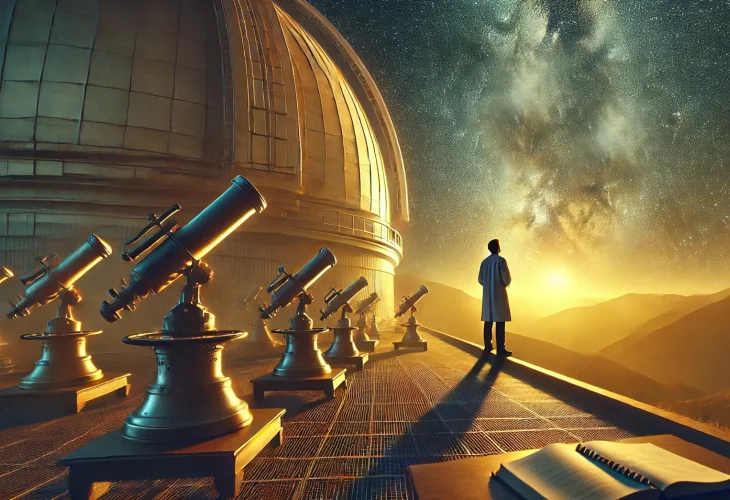In Search of God
When Scientists Discover God: How Modern Physics Points to a Creator
Leading astronomers and physicists reveal how cutting-edge science is uncovering purpose, design, and divine intelligence behind the universe

The world-renowned astronomer Allan Sandage, spent his life exploring the deepest mysteries of the cosmos. Raised as a staunch atheist, he built a brilliant career studying the origins and fate of the universe — peering through telescopes from Chile to California, searching for answers hidden in the stars.
His research on distant galaxies helped measure the rate of the universe’s expansion, and brought him face to face with profound questions: “Why does anything exist at all, rather than nothing?”
Over time, Sandage realized that logic alone could not answer such questions. At age 50, he made a remarkable shift: “Science led me to the conclusion that the world is far more complex than can be explained by science. God is my natural explanation for the mystery of existence.”
When Science Meets Faith
A feature in Newsweek once captured this growing convergence: “Something surprising is happening between science and religion. Allan Sandage says that the scientific community today often dismisses faith, to the point where admitting belief is almost taboo. But now theology and science are entering a new relationship.”
Physicist-turned-theologian Robert John Russell, founder of the Center for Theology and the Natural Sciences at the Graduate Theological Union in Berkeley, explained: “Far from undermining faith, modern discoveries are strengthening it. The Big Bang, once thought to rule out a Creator, now points to design and purpose behind the universe.”
Even evolution, according to some scientist-theologians, reveals clues about the nature of God. Chaos theory, describing patterns in weather or dripping faucets, suggests openings through which divine action might occur — not by breaking natural laws, but by working within them.
A New Harmony Between Science and Belief
Across universities from Georgetown to Berkeley,theologians and scientists are building bridges between the two worlds. Books like Science and Theology: The New Harmony and Belief in God in an Age of Science are emerging from this dialogue.
At a symposium on “Science and the Spiritual Quest,” more than 320 participants and 33 speakers gathered to discuss the meeting of mind and spirit. A PBS documentary on science and faith was produced to share the movement with the public.
Fine-Tuning: Evidence of Purpose
Physicists are increasingly aware that the universe seems precisely calibrated for life and consciousness. “If the constants of nature — such as gravity, the electron’s charge, or the proton’s mass — were even slightly different,” scientists note, “atoms would never form, stars would never ignite, and life would be impossible.”
Former Cambridge physicist turned Anglican priest John Polkinghorne explained: “When you realize that the laws of nature must be finely tuned with incredible precision to produce the universe we see, you understand it didn’t just happen. There must be purpose behind it.”
Similarly, Charles Townes, Nobel Prize–winning physicist and co-inventor of the laser, remarked: “Many of us feel that somehow, intelligence must be involved in the laws of the universe.”
The Language of the Universe: Mathematics and Mind
Since the days of Isaac Newton, science has shown that the world operates by mathematical rules that the human mind can actually understand. “We invented abstract mathematics,” said Polkinghorne, “yet, miraculously, it describes the real universe. That tells us something profound about reality — that our minds are somehow attuned to the logic of creation.”
Cancer biologist Carl Feit from New Jersey added: “It seems that something in the human mind is in harmony with the mind of God.”
Chaos, Choice, and Divine Presence
Even in chaos theory, which studies unpredictable systems such as weather and chemical reactions, Polkinghorne sees room for divine freedom: “It may be that God chooses which possibilities become actual — a kind of divine action that doesn’t violate physical law.”
While most scientists still separate personal faith from their professional life, a growing number admit that science itself inspires spirituality.
A recent study revealed that 40% of scientists believe in a personal God — not just an impersonal force, but a Creator they can pray to.
A Universe That Awakens the Soul
Astrophysicist Joel Primack of the University of California, Santa Cruz, explained: “The study of science provides spiritual inspiration.”
He points out that humans exist exactly in the middle between the largest and smallest scales of reality — between the size of the universe (10⁺²⁹) and the tiniest subatomic world (10⁻²⁴). “Perhaps,” says Primack, “this restores to us a sense of dignity — a cosmology that satisfies both intellect and soul.”
As Mark Richardson of the Center for Theology and the Natural Sciences concludes: “Science cannot prove the existence of God, but it can serve as a witness to His character.”

